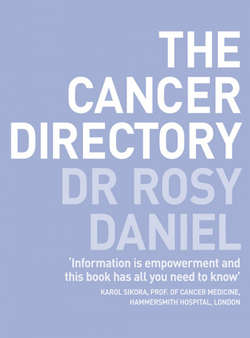Читать книгу The Cancer Directory - Dr. Daniel Rosy - Страница 27
Dr Stephen Greer: The Role of a Fighting Spirit and Alleviating Depression
ОглавлениеBefore Caryle and Ian’s work, back in the mid-80s, psychosocial oncologist Stephen Greer published his work showing how the very different survival times among women with breast cancer depended on the coping style they adopted within a week of the initial diagnosis. The coping styles he defined were:
• a fighting spirit – taking an active stand against your cancer and believing fully that you can affect your survival
• denial - pretending to yourself and others that nothing is seriously wrong
• stoicism or fatalism – leading to becoming resigned to what is happening
• helplessness and hopelessness – becoming anxiously preoccupied, or collapsing.
His findings showed that those with a fighting spirit fared far better than those in the other three categories both in terms of quality of life and overall survival. Those in denial did next best whereas those who were resigned, depressed and anxiously preoccupied did least well of all. At the 13-year point, 80 per cent of those who had started with a fighting spirit were still alive versus only 20 per cent of those who had collapsed into helplessness. Worse, those who had psychologically collapsed had died quickly, within two years of diagnosis. This means that the average survival rate of 60 per cent for breast cancer at five years masks a huge difference between those who do very much better than expected because of a positive belief in themselves compared with those who do very much worse because they do not.
As this difference in survival rate is bigger than that seen with any medical treatment for breast cancer, Dr Greer realized it was very important to identify those who reacted negatively to their diagnosis and help them to change psychologically so that they could begin to believe in themselves more and become less depressed. Through the use of cognitive behavioural techniques, such patients gained self-esteem and confidence, and began to believe they could survive. Lo and behold, his later studies on the survival rates among these women showed great improvement.
The lessons here are:
• It is vital to feel empowered and believe in your ability to heal yourself
• It is vital to lift your depression
• It is vital for healthcare professionals to provide extra psychological help to improve the coping styles of those who have responded by becoming helpless and anxiously preoccupied by their illness.
